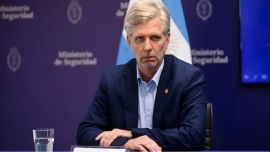The exact timing of Economy Minister Martín Guzmán’s abrupt exit last weekend may have been influenced by a vengeful intention of knocking Vice-President Cristina Fernández de Kirchner’s much-vaunted Ensenada speech out of Sunday headlines but it was only a matter of time – having rescheduled Argentina’s dollar debts on the basis of an increasingly less sustainable agreement with the International Monetary Fund, Guzmán found the impossibility of renewing peso debt staring him in the face and decided to call it quits before colliding with that brick wall.
The changes are limited to the Economy Ministry for now with the more global relaunching of the Frente de Todos administration originally envisaged indefinitely postponed by the chronic differences within the ruling coalition but paradoxically enough, this more limited change spells far more drastic turns of the screw for economic policy. The focus of the overhaul had been Congress Speaker Sergio Massa moving to Cabinet chief. There are various theories why this failed to happen – ranging from a flat vice-presidential veto to all factions being agreed on his virtual premiership but his setting impossible conditions and even Massa increasingly sharing the veep’s supreme disinterest in forming a responsible part of a nose-diving administration and saying no, like so many candidates for the Economy Ministry – but the most important thing is that it did not happen because this opens the door to Fernández de Kirchner dictating economic policy.
Always subordinating economic policy to electoral strategy in classic populist style, the former two-term president seems convinced that a 2023 election irretrievably lost with Guzmán’s IMF orientation can be turned around with an extreme transformation, including a drastic renegotiation of the IMF agreement at the very least and starring a complementary universal salary as its main attraction. This alone would take the fiscal deficit and the printing of money into new orders of magnitude. If public spending increased from 26 to 46 percent of gross domestic product in the 12 years of Kirchnerism (2003-2015), the blame is often placed on the expansion of the public sector, which actually rose by a lower percentage in that period (from 2.2 to 3.7 million employees). The main explosion came from making pensions virtually universal irrespective of contributions, taking them up to over half the budget alongside family benefits and 13 percent of GDP. There were strong reasons of social justice for this trend since the alternative was the almost complete abandonment of millions of elderly people, given the stagnation of formal employment in the last decade, but a sea of fiscal red ink has become an ocean. This does not unduly worry the vice-president, who sees fiscal deficits as virtually worldwide in a post-pandemic world and therefore discounts them as a cause of inflation, overlooking that other governments run on credit – something out of the question for Argentina with a country risk rate closer to 3,000 than 2,000 points. Since she equally rules out expansion of the money supply as a cause of inflation (influenced by the printing of trillions of dollars and pounds in the United States and Britain in response to the 2008-2009 global financial meltdown with no apparent effects during her presidency), there is thus all the potential for a monetary maelstrom with inflation and devaluation feeding each other.
President Alberto Fernández also seems to be misreading the economic signs of the times, if for different reasons. Attributing the problems to a lack of dollars rather than an excess of pesos, he sees the former as the result of the economy growing so fast that it strains the foreign currency reserves for importing the required inputs. Yet that growth, which continued into the first half of this year from the 2021 rebound from coronavirus lockdown, is highly vulnerable to the exchange rate constraints – the productive chain depends on the price chain and all prices, even for the almighty dollar, are up in the air.
This leaves the new Economy Minister Silvina Batakis. Like Massa’s absence, opinions differ over her appointment – some attribute it to her former boss, Productive Development Minister Daniel Scioli as his economy minister in Buenos Aires Province (2011-2015), and others to her most recent boss, Interior Minister Eduardo ‘Wado’ de Pedro, and hence La Cámpora, among other theories – but while more linked to Scioli, her ideas seem closer to Cristina Fernández de Kirchner. Hardly a heavyweight among economic figures, we can only wish her all the luck in the world as Argentina’s economy accelerates into crisis.


















Comments